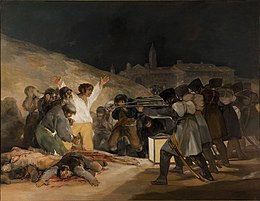Our website is made possible by displaying online advertisements to our visitors.
Please consider supporting us by disabling your ad blocker.
Extrajudicial killing

An extrajudicial killing (also known as an extrajudicial execution or an extralegal killing)[1] is the deliberate killing of a person without the lawful authority granted by a judicial proceeding. It typically refers to government authorities, whether lawfully or unlawfully, targeting specific people for death, which in authoritarian regimes often involves political, trade union, dissident, religious and social figures. The term is typically used in situations that imply the human rights of the victims have been violated; deaths caused by legal police actions (such as self defense)[1] or legal warfighting on a battlefield[2] are generally not included, even though military and police forces are often used for killings seen by critics as illegitimate. The label "extrajudicial killing" has also been applied to organized, lethal enforcement of extralegal social norms by non-government actors, including lynchings and honor killings.
- ^ a b VERA Files (14 November 2017). "VERA FILES FACT SHEET: 'Extra-legal' and 'extrajudicial' killings, explained". VERA Files. Retrieved 3 January 2021.
- ^ Bachmann, S.-D. (31 May 2013). "Targeted Killings: Contemporary Challenges, Risks and Opportunities". Journal of Conflict and Security Law. 18 (2): 259–288. doi:10.1093/jcsl/krt007.
Previous Page Next Page


